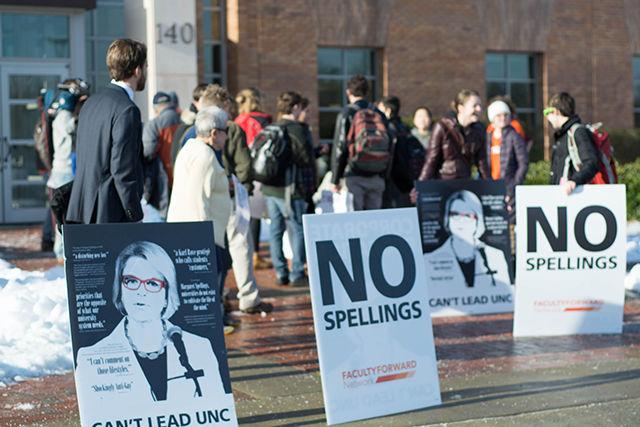Chants of “no justice, no peace” echoed throughout the UNC Board of Governors meeting on Jan. 26, as protesters grabbed microphones from the board members and threw their name placards on the ground.
The demonstrators were protesting the recent hiring of Margaret Spellings as UNC System President, as well as voicing their general frustration at the recent administration of the board.
Micaela Arneson, a recent graduate from UNC-Chapel Hill with a double-major in global studies and political science, and Millie Rosen, a Durham Public Schools teacher, were among the protesters.
“I think it would have been more effective if the protestors had stayed through the entire meeting in silent protest, so the board members could have physically seen the opposition to their decision,” Arneson said.
Rosen said she felt the frustration at the meeting too because “the board talked about the low numbers of teacher enrollment programs and then immediately cut funding to one.”
There was “no debate on how to boost those numbers,” she said.
The UNC Board of Governors is the legislative body of the UNC System. This system is composed of 16 public universities and the North Carolina School of Science and Mathematics, or NCSSM. Of these 16 public universities, NC State is the largest.
Spellings is scheduled to take office March 1 as the newly elected president of the UNC System. She graduated in 1979 from the University of Houston and received an honorary doctorate and Distinguished Alumna Award from the university in 2006.
Spellings worked as secretary of education under former President George W. Bush and helped orchestrate the No Child Left Behind Act. Spellings has served on corporate boards, including the Apollo Education Group, the parent company of the University of Phoenix and Ceannate Inc., the student loan collector.
“I think she’s terrible for education,” said Rosen, regarding Spellings’ appointment. “She was a major proponent of No Child Left Behind, and as a classroom teacher I deal with the negative effects of that law every day.
“Ask my kids on testing days — because they definitely happen many times a year, not just in May — if they feel left behind or not. Whether it’s university level or K-12 public schoovl, I don’t think anyone who advocates for that much testing should be in charge of anything education-related.”
The previous president of the system, Tom Ross, officially stepped down last month after five years. There has been continual skepticism against the actions of the board and controversy surrounding the appointment of Spellings and the anticipated relocation of Ross to Duke University.
As a part of the outrage, many protesters, students and faculty alike are concerned with Spellings’ ability to take charge of this world-class public university system and effectively advocate for and represent minority groups.
“She’s been recorded referring to students as ‘consumers,’ she’s made money off of for-profit universities in the past and she very clearly doesn’t come from a perspective that many UNC System students share — one that demonstrates any kind of solidarity with marginalized people,” Rosen said. “She’s also taken a firmly anti-LGBT stance, which doesn’t endear her to me or many students of the UNC System.”
Many protesters are frustrated in the lack of representation of universities, faculty and students in the appointment of the new president. However, the fine print may provide some hope for the protestors who desire the reversal of her appointment.
The UNC Policy Manual on Selection of the President of the University of North Carolina 2003 states, “the procedures specified herein are intended to lead to the selection, from a diverse candidate pool, of the best qualified person to be president and result in that person’s full acceptance by the university community and the state.”
“UNC-Chapel Hill and the entire UNC System represent a diverse body of students, and I doubt she will show sensitivity to minority groups,” Arneson said in a follow-up interview Sunday.
Rosen’s hopes align with most protesters who are against the board’s appointment of Spellings.
“Ideally, they would reverse her appointment and begin a search for a more inclusive leader whose installment would actually be supported by the majority of UNC System students,” Rosen said.








